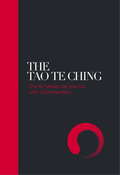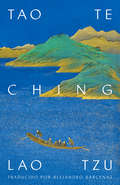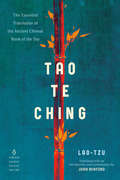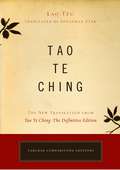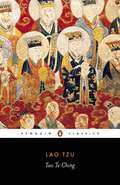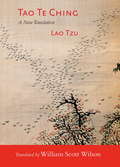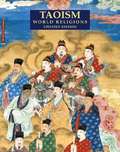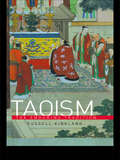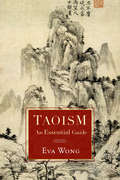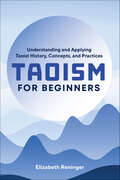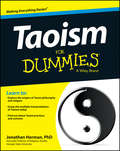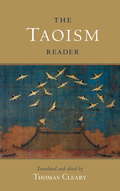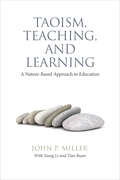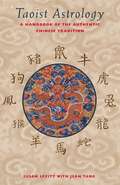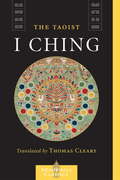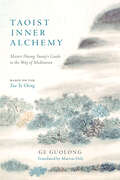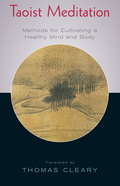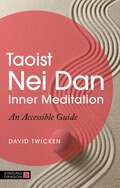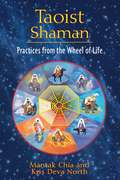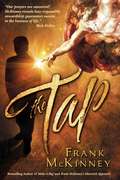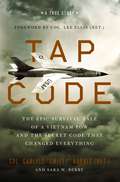- Table View
- List View
The Tao Te Ching: 81 Verses by Lao Tzu with Introduction and Commentary
by Lao TzuTao Te Ching translates very roughly as "the way of integrity". In its 81 verses it delivers a treatise on how to live in the world with goodness and integrity: an important kind of wisdom in a world where many people believe such a thing to be impossible. Taosim affirms that each human being is a reflection of the whole universe, a microcosm within the macrocosm, and that all of us live under the same cosmic laws of the Tao. The Taoist follows the path of non-action (Wu Wei), flowing with the constantly changing stream of life, and trying to live in universal harmony and balance. The easily assimiliated aphorisms in this great book are a continuous source of spiritual guidance and nourishment, and its insights on statesmanship are practical guides for our own time. Ralph Alan Dale's brilliant translation uniquely captures, as never before, the essential meaning of this profound text, and makes it entirely relevant to today's readers.
Tao te ching: The Book Of The Way (Facetas Filosoficas Ser.)
by Lao TzuTraducido al español del chino clásico por Alejandro BárcenasUna guía para vivir en armonía con nosotros mismos y la naturaleza. Esta nueva traducción al español aspira a presentar el Tao Te Ching como una experiencia de lectura lenta y meditativa. &“El Tao Te Ching es sin duda alguna uno de los libros que mayor influencia ha tenido en la historia de la humanidad. A través de su longeva existencia ha servido de inspiración a un sinnúmero de artistas, pensadores, santos, guerreros, líderes políticos, y a muchos otros por igual, en el mundo entero. Su contenido toca una amplia gama de temas de naturaleza universal, los cuales pueden ser caracterizados de manera general como religiosos, filosóficos, místicos, cosmológicos, éticos y políticos. Dicha universalidad ha hecho que su legado se haya podido extender mucho más allá de ser el texto fundacional de un grupo religioso de China, al que con frecuencia se lo conoce como Taoísmo, lo cual ya de por sí le otorgaría un gran honor y le daría intrínsecamente un puesto de notoriedad histórica. Quizás sorprenda el alcance de su fama dado que en realidad se trata de un tratado bastante breve —conocido también como el &“clásico de los cinco mil caracteres&”— y notoriamente complejo. Pero esa complejidad, transmitida por un lenguaje de gran belleza poética, es quizás una de sus grandes virtudes, ya que permite un universo de interpretaciones que transforman a todo aquel que se sumerja en su lectura&”. --De la introducción de Alejandro Bárcenas
Tao Te Ching: The Essential Translation of the Ancient Chinese Book of the Tao (Cornerstone Of ... Ser.)
by Lao TzuThe original mindfulness book, in a landmark new translation by the award-winning translator of the I Ching and The Art of War The most translated book in the world after the Bible, the Tao Te Ching, or “Book of the Tao,” is a guide to cultivating a life of peace, serenity, and compassion. Through aphorisms and parable, it leads readers toward the Tao, or the “Way”: harmony with the life force of the universe. Traditionally attributed to Lao-tzu, a Chinese philosopher thought to have been a contemporary of Confucius, it is the essential text of Taoism, one of the three major religions of ancient China. As one of the world’s great works of wisdom literature, it still has much to teach us today, offering a practical model based on modesty and self-restraint for living a balanced existence and for opening your mind, freeing your thoughts, and attaining greater self-awareness. With its emphasis on calm, simplicity, purity, and non-action, it provides a time-tested refuge from the busyness of modern life. This new translation seeks to understand the Tao Te Ching as a guide to everyday living and encourages a slow, meditative reading experience. The Tao Te Ching’s eighty-one brief chapters are accompanied by illuminating commentary, interpretation, poems, and testimonials by the likes of Margaret Mead, Ursula K. Le Guin, and Dr. Wayne W. Dyer. Specially commissioned calligraphy for more than two hundred Chinese characters illustrate the book’s essential themes.
Tao te ching: The Definitive Edition (Cornerstone Of ... Ser.)
by Lao TzuTraducido al español del chino clásico por Alejandro Bárcenas Una guía para vivir en armonía con nosotros mismos y la naturaleza. Esta nueva traducción al español aspira a presentar el Tao Te Ching como una experiencia de lectura lenta y meditativa. El Tao Te Ching es sin duda alguna uno de los libros que mayor influencia ha tenido en la historia de la humanidad. A través de su longeva existencia ha servido de inspiración a un sinnúmero de artistas, pensadores, santos, guerreros, líderes políticos, y a muchos otros por igual, en el mundo entero. Su contenido toca una amplia gama de temas de naturaleza universal, los cuales pueden ser caracterizados de manera general como religiosos, filosóficos, místicos, cosmológicos, éticos y políticos. Dicha universalidad ha hecho que su legado se haya podido extender mucho más allá de ser el texto fundacional de un grupo religioso de China, al que con frecuencia se lo conoce como Taoísmo, lo cual ya de por sí le otorgaría un gran honor y le daría intrínsecamente un puesto de notoriedad histórica. Quizás sorprenda el alcance de su fama dado que en realidad se trata de un tratado bastante breve conocido también como el clásico de los cinco mil caracteres y notoriamente complejo. Pero esa complejidad, transmitida por un lenguaje de gran belleza poética, es quizás una de sus grandes virtudes, ya que permite un universo de interpretaciones que transforman a todo aquel que se sumerja en su lectura. --De la introducción de Alejandro Bárcenas
Tao Te Ching
by Lao TzuTraditionally attributed to Lao Tzu, an older contemporary of Confucius (551 - 479 BC), it is now thought that the work was compiled in about the fourth century BC. An anthology of wise sayings, it offers a model by which the individual can live rather than explaining the human place in the universe. The moral code it encourages is based on modesty and self-restraint, and the rewards reaped for such a life are harmony and flow of life.
Tao Te Ching
by Lao Tzu D. C. LauIn eighty-one brief chapters, Lao-tzu's Tao Te Ching, or Book of the Way, provides advice that imparts balance and perspective, a serene and generous spirit, and teaches us how to work for the good with the effortless skill that comes from being in accord with the Tao-- the basic principle of the universe.
Tao Te Ching: A Graphic Novel
by Sean Michael WilsonA contemporary graphic novel adaptation of a spiritual classic.This graphic-novel version of the Tao Te Ching—the poetic classic that is the philosophical and religious basis of Taoism—brings the teachings into a modern light in a completely fresh and unique way. Each of the 81 poem-passages of the Tao Te Ching is reinterpreted by award-winning graphic novel writer Sean Michael Wilson and brought to life by the artful illustrations of Hong Kong artist Cary Kwok, who sets the text in various contemporary scenes to bring out the modern relevance.
Tao Te Ching: A New Translation
by William Scott Wilson Lao TzuRenowned translator William Scott Wilson has rendered Lao Tzu's classic in the most authentic way possible, using both the ancient text and the even older Great Seal script used during Lao Tzu's time. The result is a new and nuanced translation, accompanied by Chinese ink paintings and ancillary material. Wilson includes an introduction that tells the story of Lao Tzu, the "old man" and the "keeper of the archives," and notes to illuminate the text. He also includes two short essays--one explains the relationship between Taoism and Zen, and the other explores the roots that link the spiritual aspects of the Tao with the practice of Chinese and Japanese martial arts. Wilson's version of this ancient classic is wonderfully fresh and readable.
Taoism: The Quest for Immortality
by John BlofeldTaoism, an ancient religion with roots stretching back nearly five thousand years, combines elements of folklore, occult sciences, cosmology, yoga, meditation, poetry, quietist philosophy and exalted mysticism. Mysterious and charmingly poetic, it is a living remnant of a way of life which has almost vanished from the world. Often attacked as picturesque, worthless superstition, Taoism's future is in doubt following the Communist takeover of its homeland.
Taoism
by Paula R. Hartz"Provides a concise, accessible overview to the traditions and cultural impact of Taoism, and includes a further reading section, websites section and index."
Taoism: The Enduring Tradition
by Russell KirklandThis clear and reliable introduction to Taoism (also known as Daoism) brings a fresh dimension to a tradition that has found a natural place in Western society. Examining Taoist sacred texts together with current scholarship, it surveys Taoism's ancient roots, contemporary heritage and role in daily life.From Taoism's spiritual philosophy to its practical perspectives on life and death, self-cultivation, morality, society, leadership and gender, Russell Kirkland's essential guide reveals the real contexts behind concepts such as Feng Shui and Tai Chi.
Taoism: An Essential Guide
by Eva WongFor the first time, the great depth and diversity of Taoist spirituality is introduced in a single, accessible manual. Taoism, known widely today through the teachings of the classic Tao Te Ching and the practices of t'ai chi and feng-shui, is less known for its unique traditions of meditation, physical training, magical practice and internal alchemy. Covering all of the most important texts, figures, and events, this essential guide illuminates Taoism's extraordinarily rich history and remarkable variety of practice. A comprehensive bibliography for further study completes this valuable reference work.
Taoism for Beginners: Understanding and Applying Taoist History, Concepts, and Practices
by Elizabeth ReningerAncient practices for modern lives—the perfect taste of TaoismBegin your journey of spiritual exploration and deepen your connection to the earth. Taoism for Beginners is your easy-to-understand guide to a rich, spiritual tradition that originated in ancient China and offers a new holistic perspective.Discover the core principles and traditions of Taoism with straightforward language and simple exercises you can do anywhere. Adopting aspects of Taoism into your everyday life can bring you into peace and harmony with yourself and the world around you—a practice that's more vital than ever in our busy modern-day lives.Taoism for Beginners helps you:Feel better and feel more—Build your own Taoist practice that can help you relax, de-stress, and feel more at ease in your life.Learn history and tradition—Meet Taoism's founder, Lao Tzu, and learn the basic history of Taoism practice for the past 2500 years.This book and beyond—Deepen your practice (if you wish) with included resources for further reading and study.Explore the depth and breadth of Taoism in a clear format that you can apply to everything you do.
Taoism For Dummies
by Jonathan HermanThe definitive guide to understanding Taoism--no matter your background or faithLao Tzu's Tao Te Ching is the second most translated book in the world, and the practice of religious Taoism is on the rise in China, where adherents currently number in the hundreds of millions. Yet there remains a remarkable lack of reliable information about Taoism for curious westerners. Taoism For Dummies provides comprehensive coverage of Taoism's origins in China's Chou Dynasty, its underlying quietist principles, its emergence as a major religion, various interpretation of its core texts, including both Eastern and Western interpretations, key Taoist concepts, and much more. It also provides a fascinating glimpse of Taoism in contemporary China.The ideal guide for readers interested in this influential religion, as well as those taking an introductory course on Taoism or Chinese ReligionA valuable source of insight for those with an interest in modern Chinese culture and beliefs
The Taoism Reader
by Thomas ClearyFrom the time of its earliest sages in prehistoric China, Taoism has looked to the underlying Way of all things (the Tao) as a guide to thoughts and actions. For the Taoists, the patterns of nature revealed the answers to their deepest spiritual questions and provided the inspiration for their unique teachings. Over the centuries, Taoism has blossomed into a profound tradition with a variety of forms--all united by a single, core philosophy of radical simplicity and natural living. Today, Taoism is most widely known through the Tao-te Ching, yet its corpus of literature is vast--ranging from philosophical dialogues and essays to astonishing fables, legends, proverbs, and more. This compact collection of Taoism's greatest masterpieces introduces its most fundamental teachings and reveals the essential spirit of Tao. The Taoism Reader includes: * Tao-te Ching: the foundational source of Taoist thought by the legendary Lao Tzu * Chuang-tzu: philosophical dialogues from one of Taoism's most famous sages * Huai-nan-tzu: teachings from the time of the Han dynasty on affairs of state, natural science, and Taoist psychology * Wen-tzu: records of further sayings by Lao Tzu on the art of living * Tales of Inner Meaning: fables, stories, and jokes from the Lieh-tzu and others on the subtleties of Taoist philosophy * Sayings of Ancestor Lü: teachings from Lü Yen, a seminal figure in the founding of the Complete Reality school of Taoism and master synthesizer of China's classic spiritual traditions
Taoism, Teaching, and Learning: A Nature-Based Approach to Education
by John P. MillerThe ancient Chinese philosophy of Taoism contains profound wisdom about the cosmos, nature, human life, and education. Taoism seeks to be in harmony with nature, and using it as a guide can help us live in a way that is healing to both ourselves and the planet. Taoism, Teaching, and Learning identifies key aspects of Taoist thought and highlights how these principles can promote a holistic approach to teaching and learning. In particular, this book offers educators guidelines and pedagogical examples for how to instil a perspective of interconnectedness into their classrooms. It sheds light on how philosophical Taoism articulates a vision of the universe and life that mirrors the actual realities of nature. Providing frameworks and methods for teaching and learning based on the interconnectedness of life, Taoism, Teaching, and Learning develops an inspiring vision for education and helps us to see our world in a deeply holistic and meaningful way.
Taoist Astrology: A Handbook of the Authentic Chinese Tradition
by Susan LevittThis guide brings Chinese astrology back to its ancient roots, providing all the information you need for understanding one of the world's oldest systems of divination. The ancient Chinese people developed a sophisticated science of astrology that continues to have profound influence in China today. Rooted in the fundamentals of Taoism, it evolved into a system vastly different from Western astrology. Rather than determining personality by the time of the year in which you are born, in Taoist astrology it is the year itself that determines your character. The years form a twelve-year cycle of signs, each named after an animal. Additionally, your personality depends on which of the five traditional Taoist elements you are born under--water, wood, fire, earth, or metal. This makes for a cycle of sixty unique signs. Taoist Astrology includes information for each sign's personality, compatibility, child-parent relations, and rising and falling fortunes during the twelve-year cycle. Discussions of yin and yang, Confucianism and Buddhism, Taoist alchemy, and the connection between Taoist astrology and Western astrology give you all the background you need for understanding one of the oldest systems of divination known to humanity. Taoist Astrology differs from other books on the subject by grounding its concepts in the ancient traditions from which it originated.
The Taoist I Ching (Shambhala Classics Ser.)
by Thomas Cleary Lui I-MingThe I Ching , or "Book of Change," is considered the oldest of the Chinese classics and has throughout history commanded unsurpassed prestige and popularity. Containing several layers of text and given numerous levels of interpretation, it has captured continuous attention for well over two thousand years. It has been considered a book of fundamental principles by philosophers, politicians, mystics, alchemists, yogins, diviners, sorcerers, and more recently by scientists and mathematicians. This first part of the present volume is the text of the I Ching proper--the sixty-four hexagrams plus sayings on the hexagrams and their lines--with the commentary composed by Liu I-ming, a Taoist adept, in 1796. The second part is Liu I-ming's commentary on the two sections added to the I Ching by earlier commentators, believed to be members of the original Confucian school; these two sections are known as the Overall Images and the Mixed Hexagrams. In total, the book illuminates the Taoist inner teachings as practiced in the School of Complete Reality. Well versed in Buddhism and Confucianism as well as Taoism, Liu I-ming intended his work to be read as a guide to comprehensive self-realization while living an ordinary life in the world. In his attempt to lift the veil of mystery from the esoteric language of the I Ching , he employs the terminology of psychology, sociology, history, myth, and religion. This commentary on the I Ching stands as a major contribution to the elucidation of Chinese spiritual genius.
Taoist Inner Alchemy: Master Huang Yuanji's Guide to the Way of Meditation
by Ge Guolong Huang YuanjiA fascinating guide to the mental, physical, and esoteric spiritual transformative Taoist practices designed to increase longevity and unity with the world—with commentary and interpretation on the traditional text by a contemporary academic and meditation practitioner.Taoist alchemical practices are renowned for their mental, physical, and spiritually transformative benefits—including longevity and increased connection to the world around us. In this guide to Master Huang Yuanji&’s Taoist classic, Ge Guolong presents the basics of inner alchemy and the tradition&’s most essential meditation practices—along with explanations of the fundamental theories and methods one needs to actually start walking the path.Historically, Taoist teachers borrowed complex terminology from astrology, numerology, and metallurgical alchemy to describe the process of individual transformation that occurs as a result of long-term meditation practice. Ge Guolong demystifies that classical terminology, illuminating Taoism&’s straightforward and eminently practical philosophy. These vivid explanations of Huang Yuanji&’s discourses—a Taoist master from the late-Ming, early-Qing Dynasty (1636–1912)—are particularly striking for their clarity, relevance to day-to-day life, and close relationship to the philosophy of such works as the Tao Te Ching and Chuang-tzu. Synthesizing numerous streams of Chinese philosophy and elucidating their lived practice, Taoist Inner Alchemy is as an excellent entry point to discover the riches of traditional Taoist thought and meditation.
Taoist Meditation
by Thomas Cleary"The ancient meditation techniques of Taoism encompass a wide range of practices--with an aim toward cultivating a healthy body as well as an enlightened mind. These selections from classic texts of Taoist meditation represent the entire range of techniques--from sitting meditation practices to internal alchemy. Most of the texts appear here in English for the first time. Selections are taken from the following classics: * Anthology on Cultivation of Realization: A document from 1739 (Ming Dynasty) that emphasizes development of the natural, social, and spiritual elements in human life. * Treatise on Sitting Forgetting: A Tang Dynasty text that sets meditation practice in terms familiar to Confucians and Buddhists. * Sayings of Taoist Master Danyang: Wisdom of the Taoist wizard and representative of the Complete Reality School. * Secret Writings on the Mechanism of Nature: An anthology taken from one hundred sixty-three Taoist sources, including ancient classics and works on meditation and spiritual alchemy, along with admonitions and teachings of the great Taoist luminaries. * Zhang Sanfeng's Taiji Alchemy Secrets: A treatise on the inner mediation practices that are the proper foundation of the martial art Taiji. * Secret Records of Understanding the Way: A rare and remarkable collection of talks by an anonymous Taoist master of the later Qing dynasty (1644-1911). Traditional teachings with a sometimes strikingly modern bent. " Thomas Cleary holds a PhD in East Asian Languages and Civilizations from Harvard University and a JD from the University of California, Berkeley, Boalt Hall School of Law. He is the translator of over fifty volumes of Buddhist, Taoist, Confucian, and Islamic texts from Sanskrit, Chinese, Japanese, Pali, and Arabic.
Taoist Nei Dan Inner Meditation: An Accessible Guide
by David TwickenBased on the ancient wisdom of the Taoist tradition, this book translates cryptic, alchemical language into an accessible and straightforward guide to Nei Dan using everyday terms. Focussing on breath work, meditations, and series of movements founded in qi gong, this book aids you in attuning to your true nature and nurtures balance and wellbeing in your physical, spiritual, and psycho-emotional health.Through an integration of Nei Dan inner meditations, this book explains the art of letting go of our traumas, imprints, and conditioning and encourages a reattachment of the self to our true natures. Taoist Nei Dan Inner-Meditation builds upon David Twicken's full collection and provides a comprehensive system of Nei Dan meditation for all professionals working with Chinese Medicine and anyone interested in this form of meditation.
Taoist Shaman: Practices from the Wheel of Life
by Kris Deva North Mantak ChiaThe shamanic roots of Taoist practice • Explains the principles of the Taoist Medicine Wheel, including the Five Elements, the animals of the Chinese zodiac, and the trigrams of the I Ching • Includes exercises from the “Wheel of Love” to access the Tao of Ecstasy • Contains illustrated teaching stories about the Eight Immortals Thousands of years ago the immortals known as the Shining Ones shipwrecked on the Chinese coast. Passing their shamanic practices--such as ecstatic flight and how to find power animals and spirit guides--on to the indigenous people, they also taught them the wisdom of the Medicine Wheel. From the Taoist Medicine Wheel came the principles of Yin and Yang, the Five Elements, the Eight Forces, the Chinese zodiac, and the I Ching. The Taoist Medicine Wheel can also be found at the foundation of traditional Chinese medicine and the esoteric sexual practices of Taoist Alchemy. In the Taoist Shaman, Master Mantak Chia and Kris Deva North explain the shamanic principles of the Taoist Medicine Wheel, how it is oriented on the Five Elements rather than the Four Directions, how it relates to the twelve animals of the Chinese zodiac and the trigrams of the I Ching, and how it aligns with the Eight Forces of the Pakua. Through illustrated teaching stories, the authors show how the energetic principles of each of the Eight Forces are reflected in the Eight Immortals. Revealing the wheel’s application to sacred sexuality, they offer exercises from the “Wheel of Love” to strengthen and deepen relationships as well as providing a means to access the Tao of Ecstasy.
The Tap
by Frank McKinneyDiscover a profound spiritual practice leading to success in the business of life. The Tap is about accepting the inherent responsibility and gaining the confidence in your ability to handle more, whether it's more wealth, health, happiness, or relationships. This book is for those who don't feel they're succeeding at the level they desire in the business we're all in: the business of life. Whether you're seeking greater financial rewards or some other kind of uplift, this book reveals there's one solution: Learning to feel The Tap and then acting on it. It primes you to start thinking that the rewards of success aren't meant for you alone, regardless of whether those rewards are already in hand or coming soon. But the rewards will come with astonishing speed and size to those who act on the greater responsibility that comes with greater blessings. Inspired by the biblical passage, 'from those to whom much is entrusted, much will be expected,' The Tap promises readers that as they attune themselves to this enduring truth, they'll feel God's tap and experience breakthroughs beyond comprehension. In The Tap, renowned real-estate "rock czar" Frank McKinney reveals the most important spiritual principle and practice of his astronomical success. He reveals how God has tapped him (and taps everyone) many times in life, answering prayers and presenting life-changing opportunities. Why, then, haven't you always recognized your own "Tap Moments"? The author explains this common oversight and leads you to find how you, too, have been blessed with the special ability to succeed at some level, yet the rewards of your success aren't meant for you alone. The author isn't a preacher or man of the cloth; he's a businessman who's discovered that faithful stewardship is a prerequisite to receiving greater resources. This inspiring yet practical guide is for those who want to succeed at a higher level with the business we're all in: the business of life. In The Tap, McKinney shows how you, too, can enrich your life beyond what you might ever have imagined for yourself--if you learn how to listen and respond to The Tap. The Tap: Feel it, follow it, and find your highest calling. Sensitize yourself to God's call and be prepared for the times when you're most likely to experience Tap Moments. Have confidence to handle the rapid rate of ascent that usually accompanies The Tap. Realize why you can't really understand or apply such popular ideas as the law of attraction and 'the secret' until you've been tapped. Combine compassionate capitalism and spiritual stewardship for progressive business models and practices.
Tap Code: The Epic Survival Tale of a Vietnam POW and the Secret Code That Changed Everything
by Carlyle S. Harris Sara W. BerryTap Code shares never-before-told details of underground operations during the Vietnam War while weaving in an inspiring story of true love, honor, and courage as husband and wife endured the hardest circumstances they had ever faced. When Air Force pilot Captain Carlyle "Smitty" Harris was shot down over Vietnam on April 4, 1965, he had no idea what horrors awaited him in the infamous Hoa Lo prison--nicknamed the "Hanoi Hilton." Harris was the sixth American POW captured in the air war over North Vietnam, and for the next eight years, Smitty and hundreds of other American POWs--including John McCain and George "Bud" Day--suffered torture, solitary confinement, and abuse. Their dignity was taken, their wills were challenged, and their bodies were bruised and battered. But in the midst of the struggle, Smitty remembered once learning the Tap Code--an old, long-unused World War II method of communication through tapping on a common water pipe. He covertly taught the code to many POWs, and in turn they taught others. Simple and effective, the Tap Code quickly spread throughout the prison and became one of the most covert ways for POWs to communicate without their captors' knowledge. It became a lifeline during their internment--a morale booster, a vehicle of unity, and a way to communicate the chain of command--and was instrumental in helping them prevail over a brutal enemy. Back home, meanwhile, Harris's wife, Louise, raised their three children alone, unsure of her husband's fate. One of the first POW wives of the Vietnam War, she became a role model for many wives, advocating for herself and her children in her husband's absence. Told through both Smitty's and Louise's voices, Tap Code shares a riveting true story of ingenuity under pressure, strength and dignity in the face of the enemy, the love of family, and the hope, faith, and resolve necessary to endure even the darkest circumstances.
Tapestry: A Story of the Healing of the Soul
by Hunter D. Darden"When you lose someone you love, you lose a little _piece of yourself.. Life isn't always fair, and Olivia has experienced more than her share of it. At the tender age of two, she lost her big brother, whom she adored. Then, as a young adult, she loses her father and then her sister. Has God packed up his suitcases and moved out of her life? Sometimes she wonders . Loving is hard--too hard--because it means risking losing someone else. But could joy and love await her, beyond the days of whys, the wishful thinking, and the regrets? She finds herself drawn to Jack, the landscape architect for The Ragweed Garden, but so much has to happen in her own heart first. A poignant, life-changing story widely used by hospices and church libraries "Readers who have lost loved ones and questioned God's presence in the process will find comfort here:'--Dr. Robert R. Shelton, Pitt Memorial Hospital, NC
